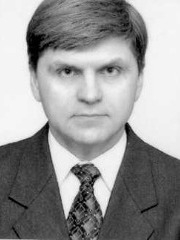Alexander Olegovich Kasyanov
Professor
Institute of Radioengineering Systems and Control

Research interests:
Scientific interests: radio monitoring, radiolocation, electrodynamic modeling of microwave antennas and devices, numerical methods of applied electrodynamics, development of CAD antennas and microwave devices, calculation and design of phased antenna arrays, microstrip antennas and volume integrated circuits of microwave and EHF.
Research projects:
Selected scientific publications: "Microstrip reflective antenna arrays. Methods of design and numerical simulation "," Frequency-selective surfaces. Electrodynamic modeling and computer designing "," Electrodynamic analysis and development of CAD-oriented mathematical models of printed antenna arrays ". Member of the Dissertation Council for the Protection of Candidate and Doctoral Dissertations at the Rostov Research Institute of Radio Communication. Since 2011, he is a member of the Program Committee of the International Scientific Conference "Microwave Engineering and Telecommunication Technologies (Crimean Microwave Conference)
Teaching:
-
Satellite positioning systems
The course is designed for students who have basic training in general physics, higher mathematics, the fundamentals of radio electronics (the theory of circuits and signals, electrodynamics and propagation of radio waves, antenna-feeder devices, analog and digital electronics, radioautomatics devices). The main attention is paid to the study of: the principles of building systems and equipment for satellite navigation users, functional additions to satellite navigation systems; modern methods of navigation-time determinations (IEE) and signal processing in satellite radio navigation systems; application of satellite navigation technologies for solving applied problems.
-
"Satellite technologies in education and scientific activities"
In the discipline, topical issues of development are considered, both satellite and terrestrial segments of the network. The physical, transport, network and application protocols of the data network (DVB-S, TDMA, QPSK, RTSP, UDP, IP-multicast) are considered in detail. As a result of mastering the discipline, the required competences of students in the field of modern satellite communication systems are formed and studied: technologies for building modern communication networks based on VSAT; physical principles of transmission, modulation, signal amplification; multiservice communication networks; services of new generation; the basis for building digital broadcasting in accordance with the DVB standard; principles of building corporate networks based on VSAT-technologies.
-
Satellite communication systems
The principles of building satellite communication systems and their components are considered. The basic concepts, terms and parameters, types of services are given. The issues of electromagnetic accessibility and reliability, types of interference are covered. Methods and types of multiple access, types of modulation and noise-immune coding, as well as the principles of the operation of modern satellite modems are analyzed. Methods of signal compression for reducing information redundancy are studied, features and prospects for the development of VSAT satellite networks are given. Features of mobile satellite communication systems and general technologies for the formation of digital information flows, features of digital satellite television are considered. The main energy relationships on the communication line for satellites using the geostationary orbit are studied.
-
Satellite communication and navigation systems
As a result of studying the discipline "Satellite communication and navigation systems," students acquire knowledge of the basic principles of building and operating satellite navigation systems and solving air traffic control tasks within the requirements for such systems by the International Civil Aviation Organization (ICAO).
-
Fundamentals of the theory of electronic warfare
The course "Fundamentals of the theory of electronic warfare" examines the physical foundations of methods of active and passive radio countermeasures to radio-electronic means of command and control of troops and weapons. Calculation techniques are provided to determine the technical characteristics of the means of radio countermeasures. Methods and systems of radio-electronic and radio-technical reconnaissance of radio-electronic means are considered. Questions of radio masking and radio protection of own radio electronic means are being studied.


